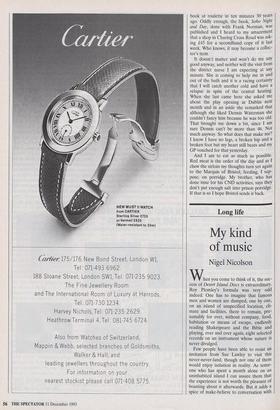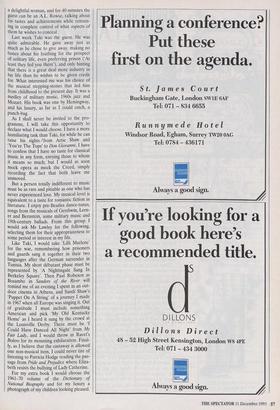Long life
My kind of music
Nigel Nicolson
When you come to think of it, the suc- cess of Desert Island Discs is extraordinary. Roy Plomley's formula was very odd indeed. One has to imagine that famous men and women are dumped, one by one, on an island of unspecified location, cli- mate and facilities, there to remain, pre- sumably for ever, without company, food, habitation or means of escape, endlessly reading Shakespeare and the Bible and playing, over and over again, eight selected records on an instrument whose nature is never divulged.
Few people have been able to resist an invitation from Sue Lawley to visit this never-never-land, though not one of them would enjoy isolation in reality. As some- one who has spent a month alone on an uninhabited island I can assure them that the experience is not worth the pleasure of boasting about it afterwards. But it adds a spice of make-believe to conversation with
a delightful woman, and for 40 minutes the guest can be an A.L. Rowse, talking about his tastes and achievements while remain- ing in complete control of what aspects of them he wishes to conceal.
Last week Taki was the guest. He was quite admirable. He gave away just as much as he chose to give away, making no bones about his loathing for the prospect of solitary life, even preferring prison ('At least they fed you there'), and only hinting that there is a great deal more industry in his life than he wishes to be given credit for. What interested me was his choice of the musical stepping-stones that led him from childhood to the present day. It was a medley of military music, 1960s jazz and Mozart. His book was one by Hemingway, and his luxury, as far as I could catch, a punch-bag.
As I shall never be invited to the pro- gramme, I will take this opportunity to declare what I would choose. I have a more humiliating task than Taki, for while he can raise his sights }from Artie Shaw and `You're The Tops' to Don Giovanni, I have to confess that I have no taste for classical music in any form, envying those to whom it means so much; but I would as soon mock opera as mock the Creed, simply recording the fact that both leave me unmoved.
But a person totally indifferent to music must be as rare and pitiable as one who has never experienced love. My musical level is equivalent to a taste for romantic fiction in literature. I enjoy pre-Beatles dance-tunes, songs from the musicals of Gershwin, Lern- er and Bernstein, some military music and 19th-century ballads. From this group I would ask Ms Lawley for the following, selecting them for their appropriateness to some period or interest in my life.
Like Taki, I would take `Lilli Marlene' for the war, remembering how prisoners and guards sang it together in their two languages after the German surrender in Tunisia. My short debutant phase must be represented by 'A Nightingale Sang In Berkeley Square'. Then Paul Robeson as Bosambo in Sanders of the River will remind me of an evening I spent in an out- door cinema in Athens, and Sandi Shaw's `Puppet On A String' of a journey I made in 1967 when all Europe was singing it. Out of gratitude I must include something American and pick 'My Old Kentucky Home' as I heard it sung by the crowd at the Louisville Derby. There must be 'I Could Have Danced All Night' from My Fair Lady, and I would throw in Ravel's Bolero for its mounting exhilaration. Final- ly, as I believe that the castaway is allowed one non-musical item, I could never tire of listening to Patricia Hodge reading the pas- sage from Pride and Prejudice where Eliza- beth resists the bullying of Lady Catherine.
For my extra book 1 would choose the 1961-70 volume of the Dictionary of National Biography and for my luxury a photograph of my children looking pleased.



































































 Previous page
Previous page